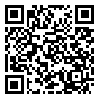جلد 17 -
جلد 17 - صفحات 0-0 |
برگشت به فهرست نسخه ها
Download citation:
BibTeX | RIS | EndNote | Medlars | ProCite | Reference Manager | RefWorks
Send citation to:



BibTeX | RIS | EndNote | Medlars | ProCite | Reference Manager | RefWorks
Send citation to:
Taghizadeh Z, Khoshnam Rad M, Kazemnejad A. Midwives’ Professional Competencies in Preventing Neonatal Mortality in Natural Disasters. J Res Dev Nurs Midw 2020; 17
URL: http://nmj.goums.ac.ir/article-1-1223-fa.html
URL: http://nmj.goums.ac.ir/article-1-1223-fa.html
Midwives’ Professional Competencies in Preventing Neonatal Mortality in Natural Disasters. Journal of Research Development in Nursing and Midwifery. 1399; 17 ()
چکیده: (5483 مشاهده)
Background: Infants are regarded as the most vulnerable group with special needs in natural disasters. Since midwives are responsible for providing reproductive health services for infants in natural disasters, this study was performed to assess their professional competencies. Methods: This cross-sectional study was conducted in Tehran, Iran. A total of 361 midwives were selected by cluster sampling method. After giving them informed consents, they participated in the study and completed the researcher-made questionnaire on providing health services for infants in natural disasters. Their professional competence was investigated through self-assessment in terms of their perceived importance, knowledge, and skill. Midwives inclusion criteria were as follows: having a degree in midwifery, having at least 6 months of experience in one of the public hospitals in the city, and a desire to participate in the study. Those who did not complete about 15% of the questionnaire items were decided to be excluded from the study.The Questionnaire included 10 items about infant care designed based on literature review of the resources and associated with the goals of MISP (Minimum package of the reproductive health services in natural disasters). To evaluate the instruments` validity, the questionnaire was given to 15 faculty members of the Nursing and Midwifery School of Tehran University of Medical Sciences. Five midwives were members of Tehran Red Crescent. After receiving comments from midwives and faculty members, the questionnaire items were reviewed. For analyzing the questionnaire reliability, the Cronbach coefficient α was calculated with 0.8. The data were analyzed by using SPSS, version 17. The analyses included descriptive and analytical statistics such as ANOVA, t-test at a significance level P<0.05. Results: Mean (SD) total score of professional competency of midwives in providing services for infants in natural disasters was 91.95(20.2) obtained from 3 subcategories: perceived importance, 39.83(9.55); knowledge, 22.5(5.06); and skill 30.16(6.86). There were significant relationships between the scores of professional competency of midwives with age (P=0.053), degree of education (P=0.028), workplace (P=0.053), and experience in natural disaster (P=0.047). About 49.86% of midwives demonstrated middle level of professional competency. The lowest knowledge and skill score were reported in managing common neonatal problems e.g. asphyxia, sepsis, physical trauma, which require referral and stability. Conclusions: The average scores of professional competencies of midwives to deliver Reproductive health service to infants in natural disasters show the necessity of related and integrated education. It is recommended that by holding emergency maneuvers and natural disaster simulations, midwives be educated with regard to natural disasters in order to know how to respond in these challenging situations.
| بازنشر اطلاعات | |
 |
این مقاله تحت شرایط Creative Commons Attribution-NonCommercial 4.0 International License قابل بازنشر است. |



